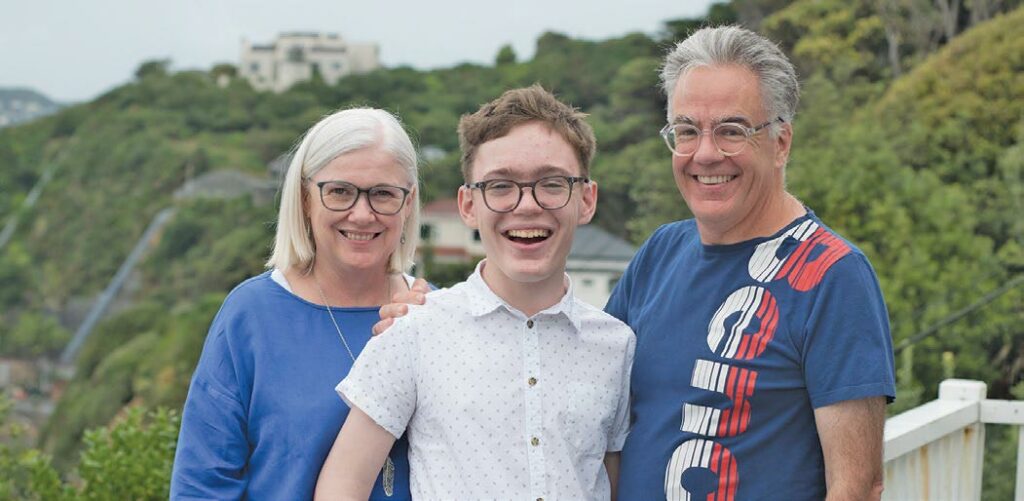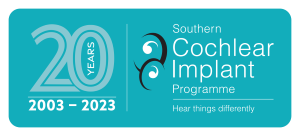Liam Melvin is brimming with enthusiasm and very outgoing. He’s a positive young 16-year-old who enjoys learning, loves being a part of the IT crew at his school Wellington College and participates in the Halberg Games when he can. Liam was born very prematurely at 26 weeks gestation and both his profound deafness and mild cerebral palsy are linked to that difficult start to his life.
In Liam’s words, his cerebral palsy is the result of slight damage to the part of his brain that controls his lower limbs and it misfires signals to his legs. He walks with a limp and has issues with his balance, so he is at risk of falls, but that’s normal to him, and like his deafness, it’s not something which troubles him. In Liam’s first year of life he had a kidney operation and hip surgery and once he had recovered from that, then cochlear implants were next.
He was 14 months old when he had bilateral cochlear implant surgery. While one cochlear implant was covered by Government funding, his parents Mark and Susan Melvin chose to self-fund the second cochlear implant as their research led them to believe that would be best for Liam. (It’s only since 2014 that bilateral cochlear implants are funded for children.)
Liam was one of the first children to have behind-the-ear speech processors rather than the little backpacks. There were regular check-ins on his language skills and by the time Liam was about three and half years old, he had caught up with his peers, which was quite a phenomenal achievement, Susan recalls. By the time Liam was probably seven, he needed limited help from his teacher of the deaf at school – the assistance was more about environmental stuff, she says.
“Liam identifies as being deaf and we always speak about Liam being deaf. Because it doesn’t matter that he’s got a device on his head that gives him access to sound, he has to put something on his head to get that access,” Susan says. Now, Liam is in Year 12 at Wellington College and manages without extra support for his deafness. He has a lift pass and takes an extra five minutes between classes to get to the next room, but that’s due to his cerebral palsy.

Liam Melvin
Like so many of his peers, Liam has become used to online learning and is coping fine with a staggered school week due to Covid-19. “I’ve found it good actually. I do like the online learning when it comes to, you know, being able to get out of bed after nine o’clock in the morning,” he says. But he misses the social interaction and time with his friends. They are the school’s IT crew, helping fellow students when they have issues with their Chromebook or Wi-Fi and taking care of the audio/visual requirements for school assemblies and presentations.
“I’ve always been interested in computers, but I do like the social nature of it, because you know, it’s a place where I can go and hang out.” No surprise then that one of his favourite school subjects is digital technology. The other is history – he’s a real history buff and a lifelong love of reading fosters that interest.
Susan is from Edinburgh, in Scotland, and Liam is looking forward to one day living in Scotland with his family connections there and walking streets where history is part of the walls. He also is interested in politics as the two subjects are so intertwined. Susan says Liam has always been able to write well and speak well, so his success in a merit endorsement for Level 1 NCEA is celebrated and passing Maths was a great achievement because it wasn’t always easy and took extra effort.
Liam enjoys swimming and heads to the pool on Sundays and his sporting life extends to dSport – an active group in Wellington for physically disabled. The youth group always has something happening and he looks forward to the yearly camp at El Rancho. He first attended the Halberg Games sports festival for physically and visually impaired children when he was eight years old and the family was living in Hawke’s Bay. That year he won a prize for the best all-rounder, recognising his enthusiasm, smiling attitude and ability to speak to everyone he met. While Liam says he’s not aiming for the Paralympics like some of the attendees, he loves the social interaction and meeting other kids. He’d like to share his life experiences with parents who are considering giving their child cochlear implants.
“I’ve been able to do debating at school. When I was in year nine, a long time ago now, my team won the debating prize (out of 20 teams).
“I would say to parents you should get cochlear implants for your child and you should support them for it. But at the same time, I also think that if the child at some later stage in life decides they don’t want to have them turned on, that they want to be part of the deaf community and culture, then you have to respect that and support that, too,” Liam says.
Susan emphasises that it’s important to understand that once a child is given cochlear implants, that’s the start of the hard work for the child and family. She feels in his early life she was Liam’s teacher as well as his mother and she’s grateful for all of the support she had.
